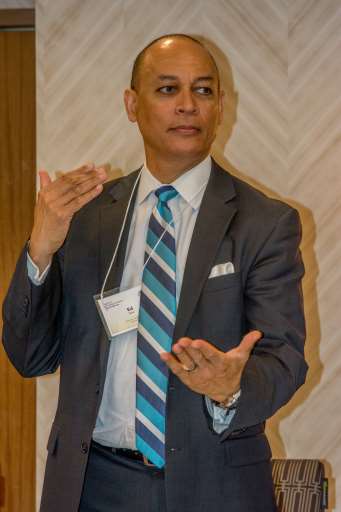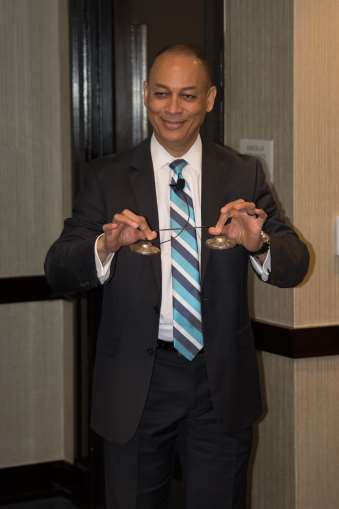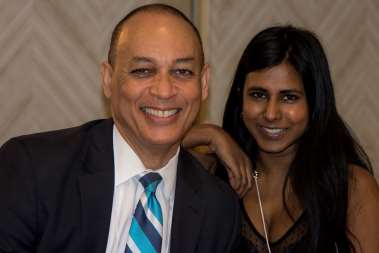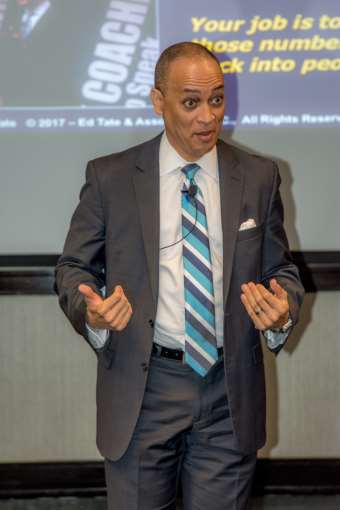Interview by Kate McClare, ACS, ALB
Photos by John Schneyer, DTM
Professional speaker, coach and leadership consultant Ed Tate won the World Championship of Public Speaking in 2000 — his first attempt. His clients include Darren Tay, the 2016 World Champion.
Tate shared advice (and lots of great stories) in several presentations at the Spring Conference. The Sunshiner caught up with him for a conversation between appearances; here are excerpts:
I love the energy that you bring to the speech. You really seem to be having a great time.
Oh yeah. My philosophy is I’m going to have fun every single day. . . . In 1995 I had an epiphany. The previous year had been a very difficult year, with one hardship after another. And I had this epiphany – I really hadn’t laughed for what seemed like the whole year. I’m sure that’s probably not possible but it felt like I hadn’t laughed in over a year. On January 1, 1995, I said to myself, that’s never going to happen again. Every day I’m going to laugh. And I’ve pretty much kept that commitment. I think one of the things that really attracted me to my wife is that we laugh every single day. And that’s just a source of joy.

How big a difference is there between when you started out and where you are now?
Let me give you a history lesson. I’m a stutterer. There is no cure for stuttering, so when you’re a child and you stutter, you get made fun of. . . . My dad was in the military when I was a child, and we moved around a lot. We would move to a new neighborhood and within days, the kids would know I was a stutterer and they’d be making fun of me. Then one day we were moving to Chicago and I thought, this neighborhood, they will not know that I stutter. . . . In Chicago, basketball is very popular, so one of the things I started doing is, I started doing play-by-play. The other guys would tell who their favorite basketball player was. I memorized that and on the court I would do the play-by-play live with these names they had given to me. My high school had a TV station and I was an announcer there for four years, and when I went to college I became a disc jockey. The whole thing was based on the fact that I didn’t want people to find out I stuttered. Then I became an executive and I started doing this speaking thing. So, when I became involved with Toastmasters it didn’t seem that hard. There was a lot of history behind it.

Can you share some of the process you went through in your championship year? Was this the first time you competed?
Yeah, I competed only once.
That’s amazing.
I was completely oblivious to the contest when I joined. Randall Shelton is the founder of my club, Cherry Creek Toastmasters in Denver, Colorado, and within six months he started saying, ‘You’re real good. You should enter this thing called the World Championship of Public Speaking.’ Now, I was new to Toastmasters. I didn’t even know what that was. But it sounded really intimidating.
About a year went by and it was getting to the point where I had to make a decision. I mean it got to the point where I was starting to get irritated. So I said, ‘Randall, here’s the deal. I’m going to enter this contest you keep talking about. And after I lose, we’re never to have this conversation again.’
Now here’s something you should know about our club. My club, from a competition standpoint, it is the district. Our people typically win the district (contest) on a regular basis. So just to win the club competition was like winning a district contest. That’s how tough it is. The competition I faced at the area and the division level did not compare to our club on an average day. I didn’t realize how good our club was. Then we got to the district. That’s when I started to think that this thing was starting to get serious.
How many times between district and the championship did you practice your speech?
I couldn’t tell you the number of times I practiced, but I can tell you the number of audiences I spoke to: seventeen different audiences. From the time I won the regional competition to when I reached the finals, it was rehearsed in front of seventeen different audiences.
Practice is a real important part of success in speaking, right?
We are paid to produce a result every day – we can never have a bad day on stage. Period. So it’s absolutely critical that we practice and we rehearse our craft.
Here’s a couple of tips on rehearsing. Number one, the mirror is not your friend. The camera is. The best way, the fastest way for you to improve is to rehearse in front of a camera. A couple things about rehearsing in front of a camera. Rule number one: You look like that. Rule number two: You sound like that. Rule number three: Get over it. We had to look and listen; now it’s your turn. [Laughs] But video is the fastest way for you to improve.
There are a couple of different ways you can rehearse. One technique is called Rehearse in Reverse. This is what we did with Darren Tay. We split up his speech into five different segments. I would call out a number – I would say ‘Four’ and he would go to that spot on the stage and give me that segment of the speech. And I would say ’Two’ and he would go to that part. I would just randomly call out numbers and it helped him rapidly memorize the speech.
The part of the speech I call the pivot, which is the most important part of the speech, he kept messing up. The first time he got it right was when he was on the stage of the World Championship of Public Speaking. Now keep in mind, we had created the speech from scratch in thirty-six hours. So it was incredible amounts of pressure. And all credit goes to him for pulling it off.

So is it that he just has that ‘it’ thing that a champion has where, OK I keep getting it wrong, I keep getting it wrong, but then, when it counts, it’s going to kick in? Is that what the one percent of speakers has, and he has it?
I believe that speaking is a learned skill. I don’t necessarily believe in it being a gift. As opposed to saying he has a gift, I’m going to say that Darren has a couple of assets. I call him One-Take Darren. He has this ability, when you say, ‘Let’s try it this way’ he does it that way – right there. There are very few people I’ve seen who have that ability.
He also has timing and he has humor. Those are skills he has had his entire life and under this crucible of the World Championship of Public Speaking, that came out. He has a work ethic and it is amazing.
I think that’s the biggest mistake that a lot of speakers make. They don’t think they have to rehearse, or they feel weird about it.
‘I’ve got my style, I’ll sound mechanical.’ No, here’s the deal. You do sound mechanical when you’re learning the material. But once you’ve learned the material, then you get a chance to sound natural. That’s how it goes.
Even jazz has a structure. It’s not just blowing a horn and being improvisational; it has a structure.
You can take a good jazz musician in a formal setting and he will play it well every time. That presentation you saw today that seemed like it was off the cuff, there was nothing unrehearsed. There was nothing unplanned. There was not one word, not one syllable, that was off the cuff. It was all planned.
That’s amazing, because it came out very naturally.
Exactly. That’s the whole thing. The art is hiding the art. . . . Once you’ve mastered the material, then it’s internalized. There’s a difference, it’s not memorized.
And then you can start to improvise.
And then you can start playing jazz.
Is it the content or the physical presentation that matters more? Or are they equal?
Here’s my thinking. Master message over mechanics. At the end of the day it’s all about the message. Look at TED Talks. They are all about the message. They’re not about how you deliver the message. Sometimes in Toastmasters, I think we can get a lttle nit-picky about the mechanics, when it’s the message that matters most.
Three of the best speeches I ever heard were by non-professional speakers. I heard a speech by a woman who worked with Mother Theresa. She ummed and she aahed, she didn’t know what to do with herself, she had nervous gestures – and it was one of the best stories I’d ever heard in my life. I heard another woman speak who had lost her daughter. And again, umms and aahs all over the place. It didn’t matter, it was mesmerizing. I couldn’t not listen. And finally there was this dentist who had lost his teenage daughter to a drunk driver. He was testifying before the Colorado State Legislature, which was voting on some changes in the drunk-driving laws. He spoke, and the message was so powerful. . . . With Darren Tay, I had thirty-six hours to prepare him, and I could not afford to be nit-picky. We had to deal with the thing that mattered, and that was message.









